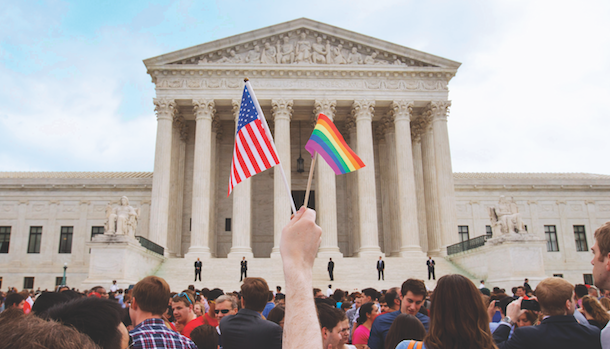VCU Coach Says He Was Fired Because He Is Gay
by Hank Kurtz Jr., AP Sports Writer
RICHMOND, Va. (AP)—VCU women’s volleyball coach James Finley is fighting to get his job back after he says he was fired because he is gay.
Finley, 52, has filed a complaint with VCU’s Office for Institutional Equity. University spokesperson Pamela D. Lepley said an investigation is being conducted and must be completed within 45 days.
The findings will be provided to Finley and VCU President Michael Rao. The coach said he would consider taking legal action if not reinstated.
He was fired on Nov. 19, one day after the Rams lost in the semifinals of the Atlantic 10 Conference tournament. The Rams finished 25-6, their best winning percentage (.806) in Finley’s eight-year tenure and their first season in the A-10.
Finley said when he met with athletic director Ed McLaughlin and executive associate athletic director Jeff Cupps, they told him their decision not to renew his contract—which expires Dec. 31—had nothing to do with his won-loss record. The coach, who is 151-116, said he was told that they would help him find a new job; McLaughlin said Cupps would even write a letter of recommendation.
That’s not good enough for Finley.
Over Thanksgiving break, Finley said, “My husband and I were talking about it, and we can’t just walk away.”
Finley said a lot of the tension began when McLaughlin, 39, took over as the AD in mid-August. The coach said he started feeling isolated.
“I have felt completely not a part of the thing that I love,” Finley said. “For one person to do that, and to meet with me for the first time and to tell me I’m not a good representative of the university—somebody that doesn’t even know me because he’s never made an effort to get to know me—there’s no other conclusion that I can come to other than that he just doesn’t want a gay person representing his athletic department.”
Phone messages left at McLaughlin’s office were not returned to The Associated Press. In a Nov. 19 release announcing Finley’s dismissal, McLaughlin said: “Our program needs a different direction and different leadership to attain our goals of achieving at an elite level nationally.”
McLaughlin, who was the AD at Niagara for six years before arriving at VCU, issued another statement this week after Finley went public with his complaint.
“I came to VCU because of how the university embraces diversity and inclusive excellence and fosters a community where differences are valued and respected,” McLaughlin said. “It is unfortunate that Mr. Finley feels the decision not to renew his contract was based on anything other than previously stated concerns about the volleyball program.”
Lepley said she could not discuss Finley’s dismissal for privacy reasons, but said in another statement that the school and McLaughlin “are fully committed to the core value of diversity—as reflected in the university’s diversity statement and strategic plan” and that VCU practices “the spirit of that policy statement every day.”
Finley believed that was true at the urban university in downtown Richmond until McLaughlin arrived. Then, Finley said things changed.
Before he was summoned to McLaughlin’s office to be fired, Finley said he and the AD had never had a conversation. When they passed in the hallway, Finley said he would say hello, and McLaughlin never acknowledged him. The coach said at one athletic event, McLaughlin mingled with other coaches and donors, but McLaughlin walked away whenever he tried to join a conversation.
“We would take our team to watch men’s soccer, women’s soccer, field hockey and Ed would be down on the bench, he would be high-fiving the kids, interacting with them,” Finley said. “He knew them by name. …He didn’t come to our games, he never introduced himself to our girls, didn’t participate with us.”
VCU has become a special place to Finley, he said, because of how fully it embraces diversity, and how it always made the coach, his husband, John Sternlicht, and their three sons feel “welcome, not tolerated.” Sternlicht said much of the athletic department attended their wedding two-and–a-half years ago.
Finley said to walk away, rather than speak out, would send the wrong message.
The most stinging blow on the day he was fired came when Finley received a call from some of his players, who he described as “distraught” after having met with McLaughlin to learn of his firing. When they told him McLaughlin said he wanted to hire someone “that will represent the university well,” Finley said “that just stabbed me in the heart.”
“When you’ve fought discrimination your whole life, you’re used to code things like ‘new direction,’ ‘we want someone to represent us well,’” Finley said. “In other words, I don’t want a gay person representing me well.”
Kristin Boyd, a fifth-year senior who is graduating next weekend, said the meeting left her and other volleyball players confused, especially since the season had gone so well.
McLaughlin “just said he wanted to go in a different direction and that he wanted better for us and he wanted somebody to better represent the school, so he wouldn’t really give anybody any more information other than that,” Boyd said. “Nobody really asked any questions because I think we were just overwhelmed and shocked and didn’t really know what to say.”
Finley said he hopes the outcome of the university’s investigation is based solely on his record as a coach.
“You always want to be judged on your work,” he said, “not on who you love.”










